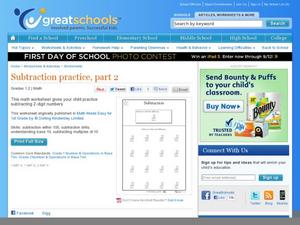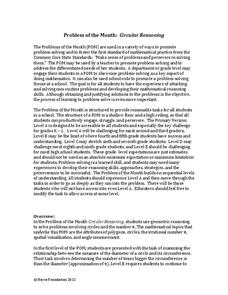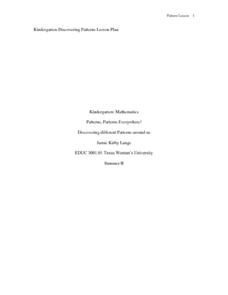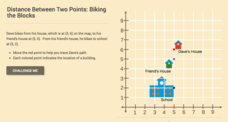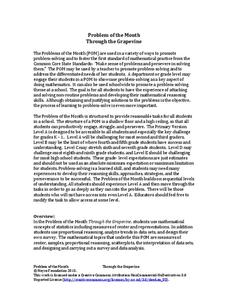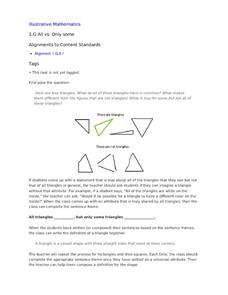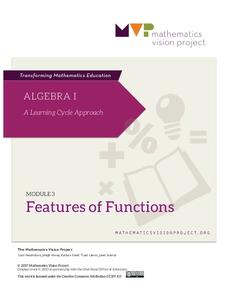Curated OER
Ordering Large Numbers: Numbers up to 9,200,000
Once learners understand place value, they can put all kinds of numbers in order - even eight-digit numbers! Fourth graders put groups of five numbers in order from smallest to largest. After they finish, they decipher a word problem and...
Curated OER
Same Shape and Size
Can your kindergartners recognize shapes? What about when they are in different orientations? Youngsters study groups of shapes to determine which have the same shape and size. Two of the groups have triangles and ovals, and the other...
Curated OER
Simple Subtraction ~ Take Away
What is 3 take away 2? Or 7 take away 5? Help your kindergartners learn the different ways to describe subtraction with a straightforward worksheet. Fourteen problems are written out for kids to solve, complete with spaces to write in...
DK Publishing
Sorting the Trees
Perfect for a math lesson during your apple unit. Kindergartners count the apples on each tree, and then count how many trees have three, four, and five apples. Once they're done counting, they draw three trees with different amounts of...
Curated OER
Subtraction Practice, Part 2
For a quick subtraction drill, these 17 problems are a great addition to your math lesson. All problems use multiples of ten, ranging from 10 to 90. Use the activity as a timed quiz or more thorough review assignment.
Curated OER
What's in Your Piggy Bank?
Fill up your piggy banks! First graders find different ways to fill up cute piggy banks with 30 cents. Will they use two dimes and two nickels? Or a quarter and five pennies? Use this activity with groups to reinforce your money math...
Rational Number Project
Initial Fraction Ideas Lesson 18: Overview
Develop young mathematicians' ability to compare fractions with investigation into the number 1/2. After brainstorming a list of fractions equivalent to 1/2, children identify a pattern in the numerators and...
Noyce Foundation
Circular Reasoning
Examine the origin and application of pi in five different levels. The five lessons in the resource begin with an analysis of the relationship between the radius and circumference of a circle. The following lessons lead learners through...
Texas Woman’s University
Patterns, Patterns Everywhere!
Not only is pattern recognition an essential skill for young children to develop, it's also a lot of fun to teach! Over the course of this lesson, class members participate in shared readings, perform small group...
Willow Tree
Slope
Investigate the different types of slope using graphs and ordered pairs. Scholars use the slope formula to determine the slope of a line between two points. Includes examples with a slope of zero and with no slope. The lesson follows a...
Noyce Foundation
Cut It Out
Explore the mathematics of the paper snowflake! During the five lessons progressing in complexity from K through 12, pupils use spatial geometry to make predictions. Scholars consider a folded piece of paper with shapes cut out....
Kiwi Crate
Shopping on a Budget
Print some money with a resource on dollars and cents. Combined with a lesson plan about budgeting, the currency includes $1, $5, and $10 bills, coins of varying value, and a platinum credit card.
CK-12 Foundation
Distance Between Two Points: Biking the Blocks
Distance estimates would be easy if the world were a grid. Scholars work to determine the distance between two structures using a coordinate plane. As an introduction, the lesson focuses on vertical and horizontal distances.
CK-12 Foundation
Points that Partition Line Segments: Cutting a Log
Teach ratios of line segments using an interactive approach. Scholars examine a line segment in the shape of a log and use their knowledge of ratios to divide it into various partitions. As an introductory lesson, the segment has a...
Noyce Foundation
Through the Grapevine
Teach statistics by analyzing raisins. A thorough activity provides lesson resources for five levels to include all grades. Younger pupils work on counting and estimation, mid-level learners build on their understanding of the measures...
101 Questions
Amazon Percent Discount
Everyone loves a good sale! A straightforward lesson provides practice with calculating a percent off of a product. Using ads from Amazon, individuals calculate the percent off the ad does not show. Pupils see the answer after revealing...
Illustrative Mathematics
All vs. Only Some
All shapes have certain defining attributes that set them apart from others. In order to understand this, young mathematicians look at examples and non-examples of triangles, rectangles, and squares, working as a whole class to create...
Mathematics Vision Project
Module 8: Modeling Data
Statistics come front and center in this unit all about analyzing discrete data. Real-world situations yield data sets that the class then uses to tease out connections and conclusions. Beginning with the basic histogram and...
CK-12 Foundation
Exponent Properties with Variable Expressions: Integer Powers
Exponent properties can be complicated for learners. A creative lesson seeks to simplify the concept and build a solid understanding. Young mathematicians have the opportunity to create numerous expressions and analyze the simplified...
CK-12 Foundation
Midpoint and Segment Bisectors: Finding Treasure with Geometry
Send your class on the hunt for a buried treasure and apply geometry skills along the way. An engaging lesson uses direction and midpoint locations to find the location of a treasure. Videos provide background information to complete the...
CK-12 Foundation
Congruent Angles and Angle Bisectors: Bisecting Pepperoni Pizza
Who doesn't like pizza? A creative lesson uses a piece of pizza to explore angle bisectors and congruent angles. Young scholars work through a simulation to create congruent slices of pizza by analyzing an angle bisector. They then...
CK-12 Foundation
Bisectors of Line Segments and Angles: Cut a Line
Geometric constructions build relationships —by simply manipulating simple tools. An interactive lesson presents a completed construction of a segment bisector and has learners analyze the important aspects. Ultimately, they should be...
Mathematics Vision Project
Module 3: Features of Functions
Learn how to represent functions in multiple ways. Learners analyze functions as equations, graphs, and verbal descriptions. The analysis includes intercepts, behavior, domain, and range. The module of seven lessons makes up the third...
Mathematics Vision Project
Module 5: Rational Functions and Expressions
Where do those asymptotes come from? Learners graph, simplify, and solve rational functions in the fifth module of a 10-part series. Beginning with graphing, pupils determine the key characteristics of the graphs including an in-depth...
Other popular searches
- Powerpoint Lessons for Math
- Lessons for Math Curse
- Inequality Lessons for Math
- Lego Lessons for Math
- Esl Lessons for Math
- Money Math Lessons for Life
- Cooking Lesson for Math
- Lesson Plans for Math




